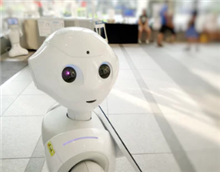(9 Minute Read) How can AI enable accountants to outsource routine tasks to machines? As well as, create more meaningful and valuable relationships with their clients? Lots of great food for thought in the below particularly if you are an accountant or an entrepreneur responsible for bookkeeping. We've taken our favourite snippets, and highlighted key takeaways throughout the text below; however, have a listen to the full #NextGenAccounting podcast interview with our AI guru here.

What are some of the Advancements Sage is making in applying AI to address the needs of accountants?
Kriti Sharma reviews Sage's entire portfolio of products and is the advisor on AI for Sage globally, across payments, accounting, people management and money. She looks at how applications of artificial intelligence and automation can help each of those areas. Not just from a technology lens, but as well as, how it relates and impacts people and society; how it affects accountants and their practices.
She tells us that the democratization of technology using AI and other digital solutions gives any business owner the same super powers. Now anyone can have a full-fledged finance and or HR department just like the CEO at a major company would have.
Smart can now be the super power for everyone!
How will AI support accountants?
Accountants can find value in mainly 3 areas, these consist of:
- Automation:
- There is a lot of manual repetitive tasks currently that accountants have to do like with entering expense receipts located in a shoe box, building reports, and chasing clients who are always last minute. AI tools really excel in this domain.
- Intelligence
- This is about looking at the data, not just building historical reports, but predicting. Understanding patterns and AI can give accountants the ability to look at volumes of transactions per second, something which a human cannot do. This is not about replacing human work with AI but about augmenting capabilities. AI and humans have different skillsets so the two coming together is great.
- Relationship with Clients
- Clients are becoming increasingly reliant on digital. They expect the same from businesses as well. Client behaviour is changing and our accounting partners need to change to keep up. This enables fast, better, more personalized communications between accountants and customers to help them run their practice more efficiently.
Ultimately the goal is that AI does the tasks that it's best at. These include: analyzing millions of transactions to detect patterns, predict cash flow, automating mundane tasks. Humans can look after tasks more adapted to them. The human element is communication, building relationships, and giving strategic advice.
The Future
A lot of accounting practices involve building dull tasks, but there's opportunities to provide more value overall and charge for that value rather than charging for the dull and boring tasks.

How can accountants make the transition from the old to the new?
In the world of automating and digitization the human element has become a premium. Accountants need to understand and really leverage that. There's a lot that technology is very good at, which is again, automation. But bringing the human connection cannot be replaced at all. This is the key value that accountants have because of the nature of the profession. We need to go back to basics. Compare online banking to in store banking. When you walked into a branch, the branch manager would know exactly who you are and give you an amazing personalized experience, ask about the family, etc. This made us stick with the brand, made us loyal to a brand. These days it's so easy to switch from A to B. Accountants have a real opportunity to build that personalized relationship with their clients yet again where technology does a lot of the manual tasks.
We are going through a massive shift, it's a great time to be experiencing this change. We really need to appreciate it and embrace it, this means using technology in ways that enables a better relationship, adds more value ultimately to the client. The more value you add, the more revenue you make. These are the basics of business.
What should new accountants do to diversify their skill set and work better alongside AI?
It's very important to both understand technology and the basics of accounting but also understand the lifestyle, behavior and digital patterns of today's clients. Would they rather chat with an AI than speak to a human to get customer support? They would need to build their own digital skills to learn to solve the problems of the future. We're going through an amazing time just bringing people of different backgrounds together to innovate and collaborate on new solutions. It's not enough to do the basics right, people expect a lot more, learn to give advice on how clients can grow their business. That's the kind of information that accountants in training need to be prepared to give.
So new accountants should make new friends outside of their discipline to enable a diversification of their skill set. Realize that your future clients may be generalists who know a little about a lot.

What do accountants now need to know about changes in AI?
It's a journey, start by setting up the basic infrastructure (make or start using Cloud software) implement it across your portfolio, then encourage clients to use it. The main steps consist of:
- Focusing on how you can add value
- Make life easier for your clients and set up technology infrastructure correctly and also upskill your staff.
- Teach staff about the new ways of interacting with clients
- For efficiency and proactivity.
- Focus on value added services a lot more
- It's not just about tasks that can be automated. To increase your availability of hours, you must build stronger lasting relationships and understand your clients' businesses really well. Something which you can afford to do if you don't have to worry about the basics. Also, make use of communication tech, clients have access to smartphones and data, so implementation will be easier going forward. There's been a great shift in consumer behaviour. Now things are changing to a point where there is a demand for real time information about a business. Accounting is no longer a task of chore, it's becoming a fun part of running a business!
We've become impatient, clients want information right here right now.
What's the cool stuff going on in the Sage lab?
We launched our smart assistant Pegg, she'll be in South Africa soon, it is a personal assistant for every business owner. The AI works kind of like Siri, but better. Pegg is a side kick that can provide 24/7 information about your business, always staying on top of your numbers, giving you access to your information in real time.

The impact that smart devices will have in the workplace is something we can look forward to; because at the moment, lots of data is being collected by batching backend processes. As we start using more smart devices everywhere , not just phones, smart everything, we'll be able to track information in real time. We'll be able to focus on the smart side, the intelligence.
Should accountants be future wary?
In the short-term (next 3 to 5 years), there will be a lot of focus on narrow domains. The Hollywood prediction that robots will take over the world is quite far away. AI is really good right now at solving narrow domain problems, in other words, you can teach an AI to drive a car or to predict what you'll type next. These are narrow domain AI.
The same applies to AI in accounting today where it can do specific tasks like recognize characters on a receipt to capture expenses. You take a photo and it detects what's in there to create cash flow projections or reports. A narrow domain task which is helping humans today and which will continue to add value.
- As this technology matures, it will learn to do cross domain things which incorporates rarer skills, such as the human ability to understand concepts of vision, speech, knowledge and then applying them all to other tasks.

Once AI technology is more accurate, the best scenario will still where humans and machines work together. This will be where we get the best of both worlds, because there's a huge demand for human intelligence and empathy that cannot be easily replaced by machines. At the same time, machines have higher accuracy and an ability to process large amounts of data, and the ability to multitask. So the best combination is when machines get smarter but are still a complement to the human world. This technology needs to be embraced in order to succeed.
Comment below, how do you use AI to help in decision making?
More Resources
- Who is Pegg? How is Sage applying AI to help customers?
- New feature for O365 with Sage 50cloud: Pegg!
That's all for now, thanks for reading!
For more resources visit: Sage Product Support Resources for help with products in North America
Sage 50CA:
Sales: 888-261-9610
Service: 888-222-8985
Support:888-522-2722
Please take a moment to share and rate this post with your social media followers because I know that your friends will love it.






